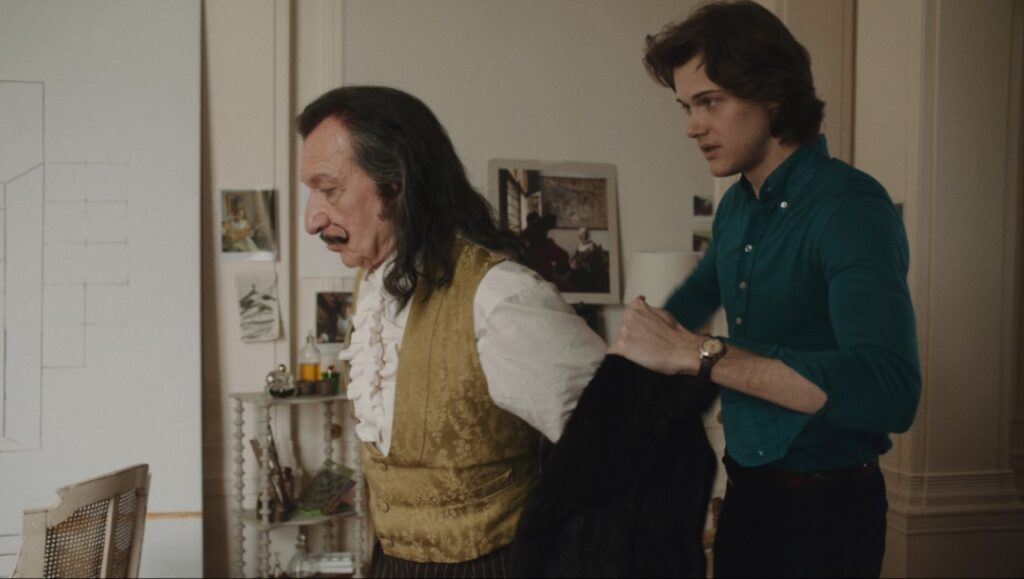The challenge of representing larger-than-life figures is that it can be hard to fit them in frame. But what about figures who abstain from the logic of measurement at all, figures bigger than death and smaller than birth; sex-obsessed virgins defining their purpose in the purposelessness of their pursuits? Enter: “Dalíland,” or the St. Regis hotel of an aging Salvador Dalí (Ben Kingsley). It’s through these doors that viewers enter the world of Mary Harron’s newest film, and find in it a retinue of young artists and others orbiting the remains of the great Surrealist painter, whose main source of direction has become his wife and muse, Gala (Barbara Sukowa), and whose main creative output has become himself, an endeavor that proves far less financially rewarding — in fact, antithetically so — than the paintings that first made him famous over four decades before.
In Dalíland, the artist may be king, but Gala is Queen and conqueror. She steamrolls gallerists and art dealers to command high prices for the rushed work of her not-so-prime husband with a force that she has no shame in using against him, too. James (Christopher Briney), an employee of one of these gallerists, is an Idaho-born art-world parvenu who realizes very soon after beginning art school that “the fact he loves art does not make him an artist.” James is reeled into the world of the Dalís as a target of Gala’s seduction, and he quickly becomes enmeshed in the glamorous, sex-full coterie of pseudo-surrealist hangers-on.
Unfortunately, viewers enter the textured world of Dalì through the glazed eyes of James, and are subsequently never able to leave. In Dalíland, it feels as though the audience is held hostage by the limited perspective of James’ glazed-over eyes. His slack-jawed way of looking at the world somehow causes the surreal to become sterile. Not only does he experience no deeper insight or truth about art or the world around him, but he’s not even given the chance to truly ask or consider the intriguing questions. He’s also the least interesting character in a group that includes Alice Cooper (and the most unconventional and high-profile artist-muse relationship of the 20th century), which begs the question: why did Harron decide to focus on James instead of Gala, measuring her from a distance rather than up close?
Even with all the sexy complexity that weighs the tempestuous relationship between Gala and Dalí, the relationship feels thin because it’s not given room to develop depth. Instead, it grows in the periphery of James’ perspective, always there, humming along behind closed doors. In the spare moments where the audience is permitted to enter these doors — to see the fire between Gala and Dalí, to partake in a world baked by his reckless debauchery — it’s done with flat affect. Grand scenes featuring the St. Regis and a Spanish castle feel bland and insubstantial, and the inverted, perverse vision of Dalí the artist feels hopelessly lost within the straightforwardness of Harron’s observation. Initially, the director does show promise of a visual language attuned to that of Dalí; when Christopher first enters the painter’s room, the camera dolly-zooms and twists in such a way that the space feels formless, kinetic, and, yes, surreal. But this promise soon fades, and we are left in the world of a surrealist that feels painted by a post-impressionist: the scenes are nice, the faces are smooth, but no stimulus successfully rises to any lasting provocation.
Kingsley’s portrayal is uninspired, though not abjectly terrible, which is feat enough given the task of portraying someone who has been portrayed and repackaged so many times that, for many, his portrayal has become a parody of the man. Something similar could be said for Briney, whose bland work is nonetheless able to pace his co-stars, albeit with white knuckles bursting at the bone. Sukowa, for her part, is superb, as is Suki Waterhouse in a supporting role, but their excellence, paired with their brevity on screen, only teases and frustrates with glimpses of what Dalíland could have been. It’s hard to watch Harron’s latest effort and not feel sadness for its subject, not because of the suffering viewers will encounter in seeing life already lived, or in mourning an alternate reality that may have never actually happened at all, but due to the continued death of a future first promised by surrealism: a future of provocative, revolutionary art, one that through a super-reality of unconsciously constructed imagination, would allow us to transform the banalities and slog of reality as we know it into something fantastical and new; that is, something life-affirming. After all, that is what makes movies, in their purest form, magic
Published as part of InRO Weekly — Volume 1, Issue 23.
Enjoy our content? Want early access to features, interviews, and more? Support us on Patreon!


Comments are closed.